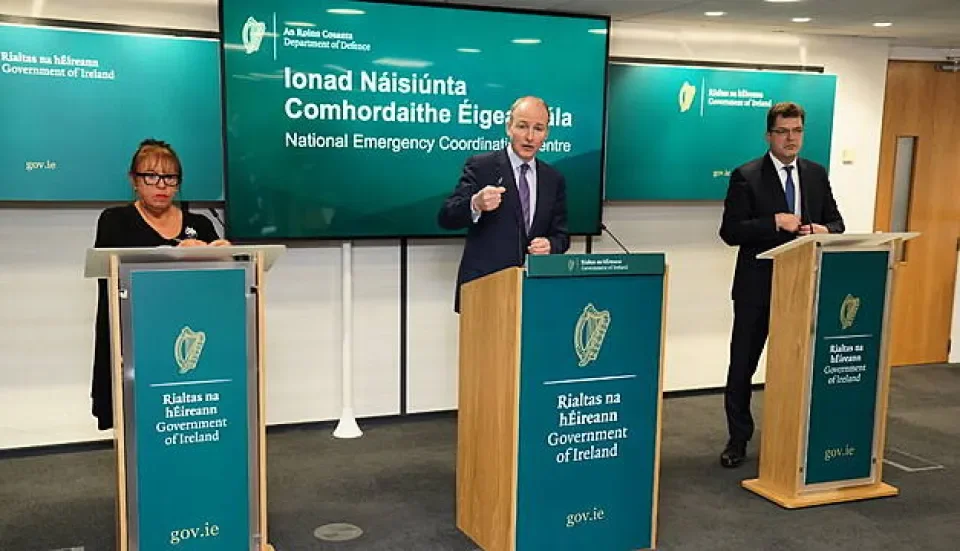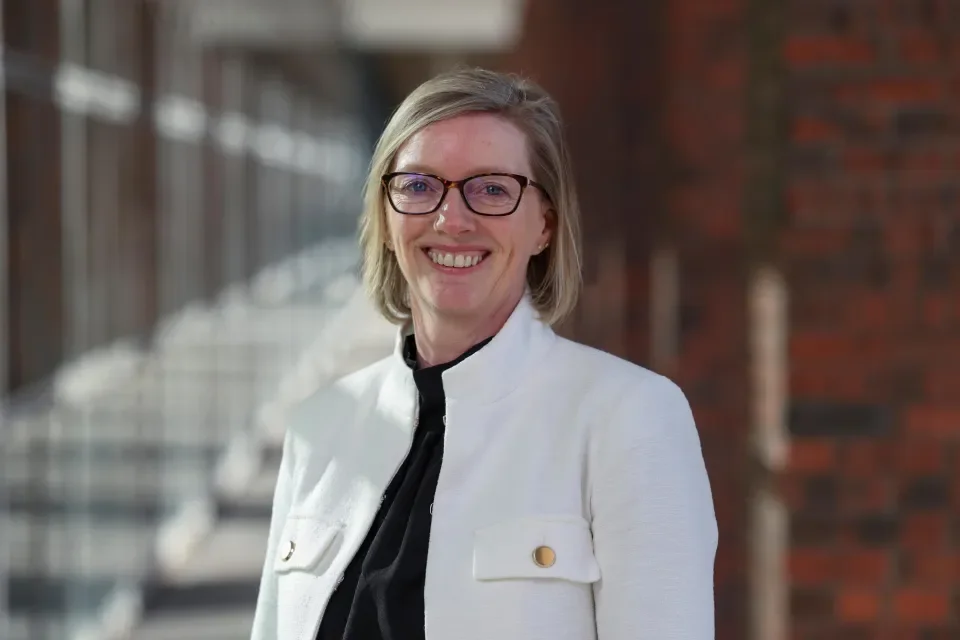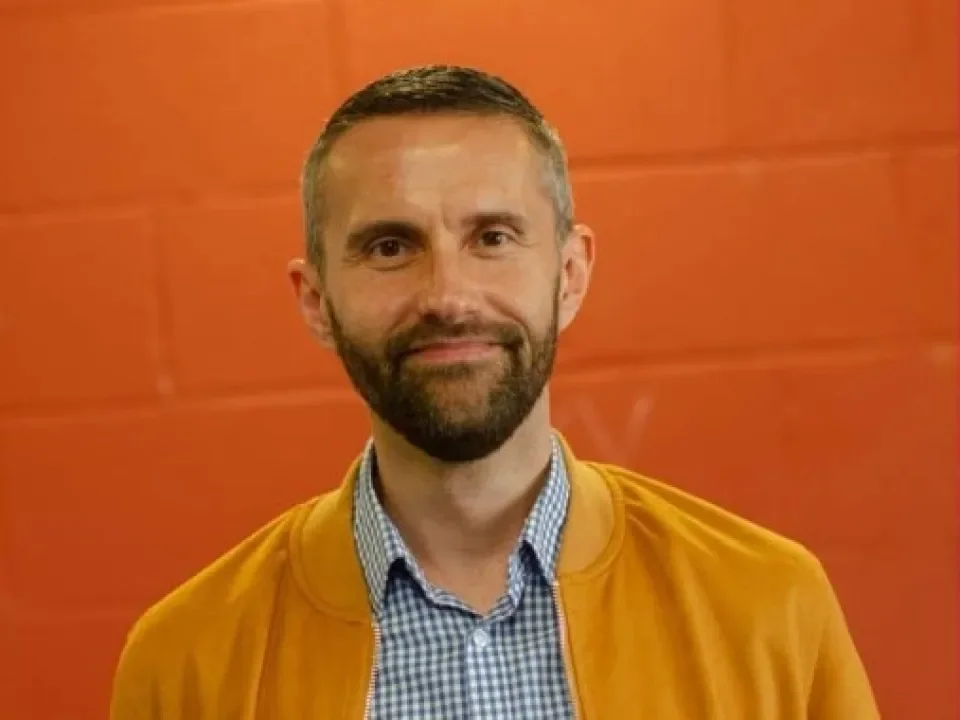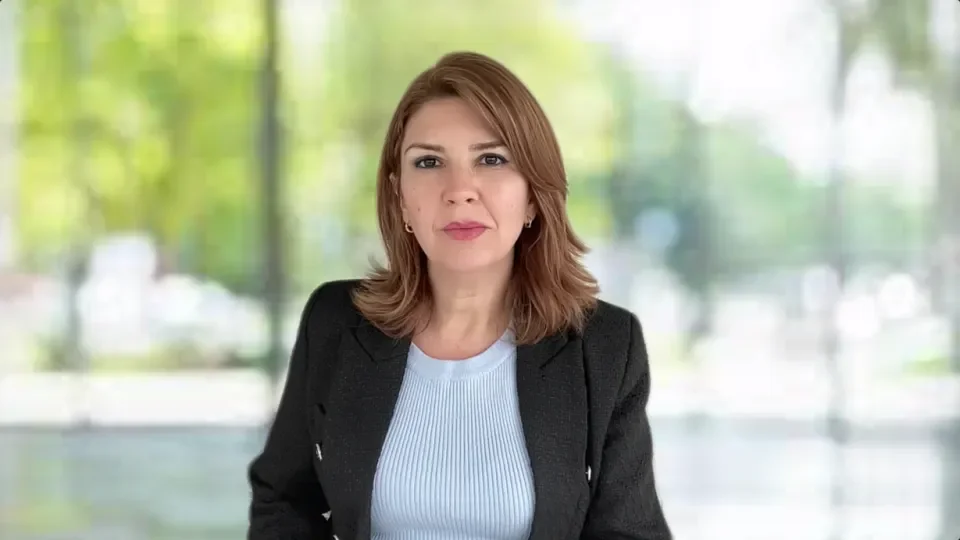
Research Newsletter - Issue 101: Spotlight
Coming through in a crisis: the DCU research scanning the horizon and examining emergency response
February 2025
Whether it is a climate induced natural disaster, a stronger than usual seasonal storm, or a fire breaking out in a busy office there are a range of threats of varying intensity and scope for which we must be prepared. For those most affected, the effects can be equally devastating across the board. Researchers at DCU are working on prediction, analysis and response to a range of emergency and crisis situations.
Effective Risk Scanning
What are the biggest risks facing Ireland and how well prepared are we to meet these challenges? This is the central question informing much of Prof. Caroline McMullan’s (DCU Business School) research.

Prof. Caroline McMullan; Taoiseach (then Tánaiste) Micheál Martin; and EU Commissioner for Crisis Management Janez Lenarčič
Under the umbrella of FUTUREPROOF-IE, the Scanning for Impact (S4I) project at DCU Business School was established to enhance the Irish National Risk Assessment (NRA) process. Prof. McMullan and her team published a report on the design and rollout of a horizon scanning methodology for identifying emerging risks which could trigger a national-level emergency.
The report’s recommendations were based on a systematic review of good practice from a wide variety of contexts. This analysis involved mapping how government departments and agencies, private sector organisations and other entities carry out horizon scanning by way of a series of mini case studies. These case studies included Dublin Bus, VHI Healthcare, Libraries NI, FIFA, as well as Dublin City University.
It goes on to set out a seven-step process for the identification and management of emerging risks that could trigger a national-level emergency. Finally, it provides an implementation guide designed to deliver an enhanced approach to strategic risk management oversight, which will be governed by the Government Task Force on Emergency Planning. The report was launched by the Tánaiste Micheál Martin and the EU Commissioner for Crisis Management, Janez Lenarčič, in March 2024.
In terms of next steps, Prof. McMullan is also collaborating with the SFI Insight Centre for Data Analytics and Smart DCU on a project examining the use of digital twin technology in preparing for and responding to emergency situations in smart buildings.
Crisis Communication
In any emergency situation timely, accurate and clear communication from trusted outlets is crucial. However, this is easier said than done. In reality the requirements for effective crisis communication are numerous and complex. One frequently overlooked and under-resourced aspect is the need for multilingual and multicultural crisis communication. Today’s society is highly mobile: cities and towns tend to be multilingual microcosms. Furthermore, crises are transboundary: they do not observe international borders.

Prof. Sharon O'Brien
As climate-related and other types of disasters increase in number and tools for generation of (false) content also become more popular, this need is only becoming more acute. DCU's Prof. Sharon O'Brien (SALIS & Dean of Graduate Studies), Dr Patrick Cadwell (SALIS) and Dr Aline Larroyed’s (SALIS) work looks to address this issue.

Dr Patrick Cadwell
Prof. O’Brien and Dr Cadwell initially proposed the first ever maturity model for crisis translation. Maturity models have previously been used to assess performance across a range of sectors. They can be thought of as road maps for identifying one’s current position and providing directions towards improvement. This preliminary model is now being updated with input from collaborators in the NGO, health and governmental sectors.
Since this initial phase the team have worked with organisations to such as Goal, Amnesty, the HSE, and migrant rights organisations to build this model into a useable resource for a wide range of organisations. The model takes several different formats from adhoc response, through to organisations with longstanding, established workflows.

Dr Aline Larroyed
In the next phase of the project, Dr Larroyed has secured a Research Ireland Postdoctoral Fellowship for a project examining translation and access to basic human rights for people in crisis situations. Specifically she will be gathering feedback from organisations who actively use the maturity model to further refine it for future use.
These two projects are vital interventions which will make a difference in emergency situations. Scanning the horizon there are unfortunately multiple threats facing Irish society, and the international community, as the impact of Storm Eowyn demonstrated. Research at DCU positively effects our lives in many ways, including mitigating the effects of events which can be the most disruptive.
